originally posted at https://canmom.tumblr.com/post/163102...
It’s time for more Happy Times in Fun Seagull Land!
Last time we learned the circumstances in which Shannon (her work name, and the one the game uses most of the time) was pushed into making a deal with Beatrice: if she breaks a mirror in the torii on a small reef close to Rokkenjima that’s been interfering with Beatrice, Beatrice will use her magic to arrange that she ends up with George. While Shannon refuses, at some point later she gives in and smashes the mirror, and we saw from the aquarium scene that she and George have gotten together.
@o3ds pointed out an aspect to this already fucked up situation that I hadn’t paid enough attention to:
the individual that goes by Shannon is supposed to be 16 while George is 23 or so. Just putting some context to this narrative.
George’s age has been given, but I keep thinking he’s only one or two years older than Shannon, but no, he’s quite significantly older. That adds to the already significant power dynamic between them.
We resume with Jessica talking to Shannon about her trip with George. Jessica’s… rather pressuring Shannon about why she wasn’t more intimate with him. Damn, Jessica, back off, I don’t want to dislike you :(
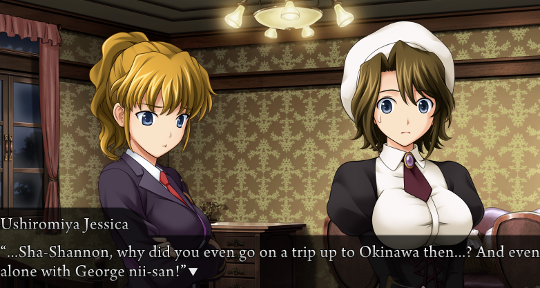
She does not back off, badgering Shannon about ‘progress’ i.e. why they didn’t have sex. It’s very uncomfortable.
Shannon makes a sort of wait-until-marriage argument, referencing God. The reference to God sounds Christian, but I’m not sure how these kinds of norms work in Japan, or if similar norms apply in Buddhism and Shinto.
In any case, Jessica has a bit of a rant about how really she’s just jelly that Shannon got a boyfriend before her, and then has an asthma attack. As she recovers, she starts wondering aloud what is so bad about herself that her peers are getting boyfriends and she hasn’t. Make your own ‘tfw no bf’ jokes if you’re mean I guess? Shannon does emotional labour and the narration mentions she’s the only person Jessica feels safe revealing her feelings to. Jessica does her best to repress her emotions.
(I don’t want to be That Lesbian, but boys aren’t all they’re cracked up to be, you know? But yeah. Patriarchal relationship obligations, compulsory heterosexuality, and just loneliness - I do feel sorry for Jessica even if it’s not cool to take it out on Shannon. Not cool, but psychologically plausible etc. etc.)
Words from the future
Reading this in 2022, I feel a little pained. 2017!Bryn was so desperate to perform the right 'social justice' judgements, but this in fact a well-observed and honestly quite sweet scene.
All the same, it’s not wrong to recognise that there is a deep contradiction under the surface of this relationship—Jessica wants to talk to Shannon as an equal, as one of the only nearby people her age. Like she would with a peer, she talks through her boyfriend anxieties, and tries to live vicariously through Shannon’s relationship with George. Of course, they are inescapably not equals, and Shannon is obliged to treat Jessica as her superior. Even if it’s not an explicit duty, she’ll be moved to try to take care of Jessica’s distress, and hide her own struggles. Jessica is not the architect of this situation, and ultimately it harms her too, but most of the burden as ever goes on Shannon.
However, my take on this now is that this is an interesting and tragic dynamic to write about, rather than something fundamentally morally compromising to scoff about.
I am going to try and rein in my impulse to write these notes though, and let 2017!Bryn’s worldview stand without an apology track.
A variety of screen transitions and architecture shots later, Beatrice visits Shannon in the flower garden…
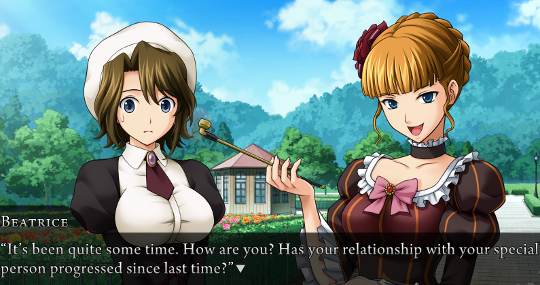
The narration, and Beatrice, suggest Shannon might be acting like things were progressing according to fate, not Beatrice’s intervention. I didn’t really get that from her dialogue, but OK.
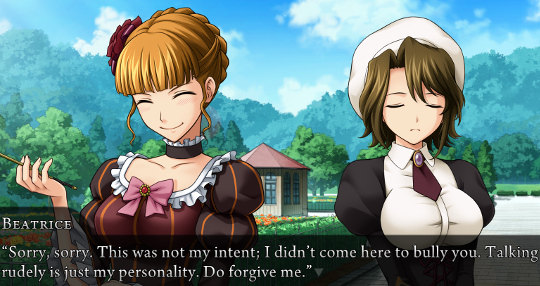
‘Just her personality’… next she’s going to try the social experiment line.
Anyway, Shannon’s trying her best not to be creeped out by Beatrice, so she gives her some cookies from the trip. Beatrice offers ‘Dolce Vita from Nero’ in return (specifically a ‘rose dolce’ would suit Shannon). This is evidently some kind of luxury good, but I’m not sure what. Nero is a Roman Emperor, and a number of other things, Dolce Vita is also many things, but I’m unable to work out what she means here. The rose suggests perfume probably?
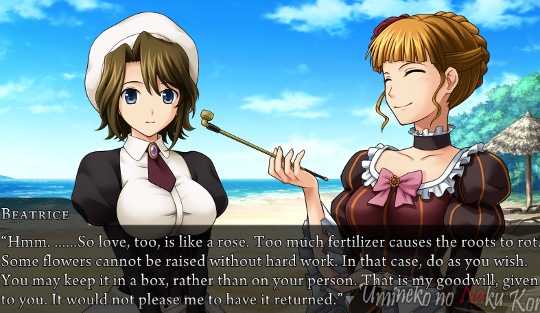
Probably more significant is Shannon attempting to return Beatrice’s butterfly brooch so she can build her relationship with George without the help of magic. Beatrice acts like this would be an affront, but I suspect there’s some magic reason that she needs the brooch to be with Shannon…
The narration (apparently summarising Beatrice) says she has often been summoned to give people magic items, and they have generally been discarded after people no longer need the magic.
The narration once again goes over the ‘wavelength’ concept, explaining that not everyone can see Beatrice. Of the servants, only Shannon and Kanon can directly interact with her, and a few others can sense her presence. Krauss and Natsuhi can’t sense her at all.
In a very interesting reveal, Beatrice reveals Kinzo has no magical talent whatsoever, cryptically saying it’s the ‘blood’. But he ‘reached the tier of mage’ through ‘frenzied solitary study’ anyway.
Beatrice notes that she only responded to Kinzo’s summons ‘on a whim’, i.e. she was not compelled to show up, and actually just wanted to laugh at Kinzo for being a tryhard scrub or something. But it went badly.
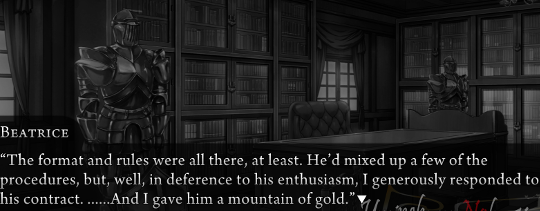
Beatrice explains that she didn’t support Kinzo’s business magically, but that his ‘bravery and madness’ might have brought about a ‘certain kind of magic’ anyway to help him succeed. And once he’d made his fortune, Kinzo went to seek the ‘truth of the world’.
Hey Kinzo, from one Seeker to another…
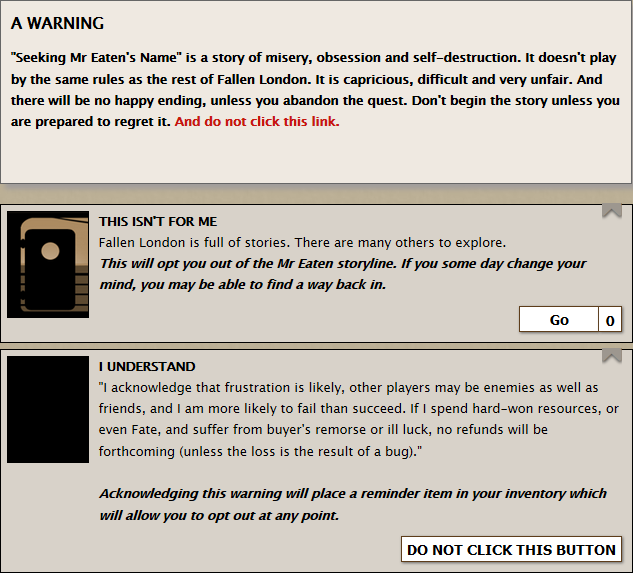
…that doesn’t go so well.
So Kinzo wants the ‘single element’ that makes up the world, the ‘final desire humans seek’. (Pretty sure it’s going to be love.) Beatrice underestimated him, and as a result was ‘sewn in place’ on this island for decades without a body until she was able to communicate with Shannon at last.
Shannon asks about the mysterious mirror that she broke.
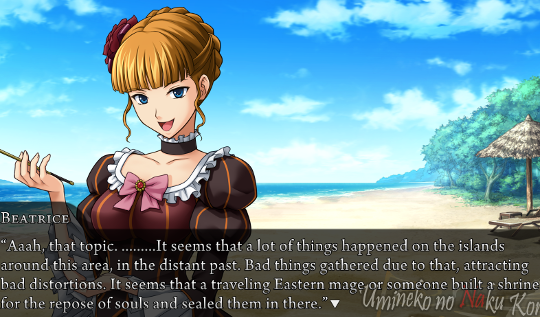
Beatrice’s answer is kind of cryptic, but apparently an ‘Eastern mage’ made it to seal away souls to deal with ‘bad things’. The magic of this ‘divine mirror’ had a different ‘foundation’ and interfered with Beatrice’s own. She makes a somewhat clunky analogy with ordering Japanese vs. Western food which probably reflects that her magic is based on European magical grimoires rather than Japanese traditions, and then sulks when Shannon finds it funny.
Beatrice mentions she was known for ‘extremely brutal things’ in the past. She chats more with Shannon, reinforcing the narrative that Shannon is ‘furniture reborn as human’ now she knows love. So brutally manipulative :(
Beatrice uses magic to show off as she chucks a teaspoon at the eavesdropping Kanon, who’s still pissed off with her. She uses magic to clean up too.
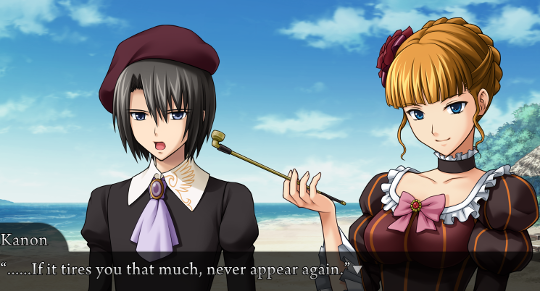
You tell her, Kanon.
After Beatrice has gone, Shannon lectures Kanon on anti-witch prejudice. Kanon continues to voice suspicions.
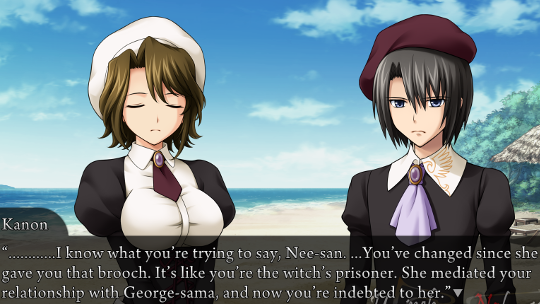
I don’t think Beatrice is necessarily magically manipulating Shannon into obedience, just in the mundane way.
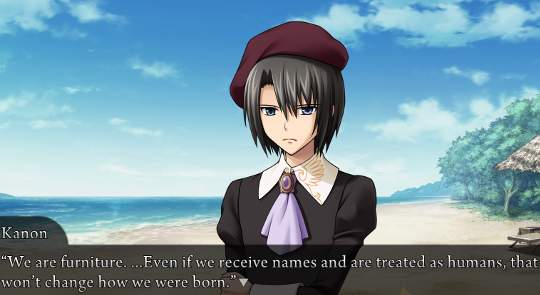
Oh Kanon :(
Their conversation is very interesting. Shannon, at least, has found the confidence to insist she’s not furniture. Kanon continues to insist neither of them are human. Shannon says that Beatrice has told her if they get the ‘single element’, they can become human. The recurring image of the colour of a cloudy sea returns (somewhat disrupted by the fact that the backgrounds show a sunny day and a bright blue sea).
A slightly difficult to translate concept relating to Japanese words for blue comes up:
![Two combined screenshots. The first is Kanon saying “…Is that what you mean? Like using the word ‘ao’ [blue] for a green traffic light?” The second part is the corresponding grimoire screen explaining this allusion:
‘The color of 青 (ao) in Japanese has a range of meanings, including “pale”, “fresh”, “young”, “naive” and the colors “blue” and “green”, in one word. The sea and sky are ao, fresh grass is ao, and so is the green on a traffic light.
Nowadays, Japanese has a native word midori for the color green, but the use of the broad word “ao” is still very common, and this is the color Shannon uses to refer to the sea. Kanon wonders if she is using “ao” to mean something other than blue.’](https://canmom.art/img/embed/umineko/ep2/36-blue-and-green.png)
Shannon gives her brooch to Kanon to reveal the blueness of the sea/love/etc. This will be important later, I’m sure.
Sure enough, the ‘single element’ is love. We get ‘without love, it cannot be seen’ in the centre of the screen.
Next: we see Kinzo outside his study, holy shit.
Comments